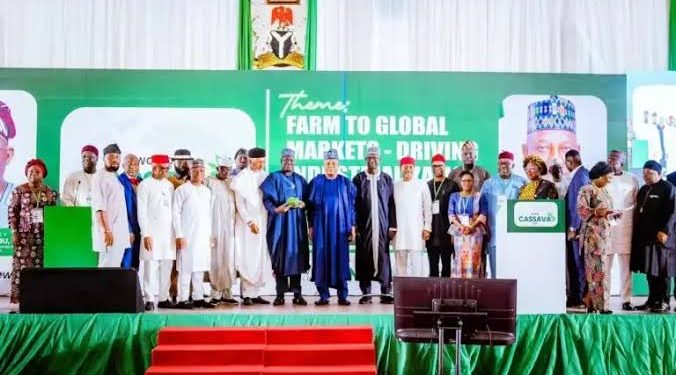Stakeholders in Nigeria’s agricultural sector have reaffirmed their commitment to deepening and sustaining investments in the cassava value chain, aligning with President Bola Tinubu’s Renewed Hope Agenda. This pledge was made during the 2025 World Cassava Day, declared open by Vice-President Kashim Shettima at the Presidential Villa in Abuja.
Shettima highlighted the administration’s repositioning of cassava as a strategic economic asset, with the goal of transforming it into a major driver of industrial development, rural empowerment, and national food and energy security. He emphasized that cassava holds untapped potential to support Nigeria’s import substitution efforts and economic diversification.
Among the key players at the event was Cavista Holdings, a company that has invested heavily in Nigeria’s cassava industry. Its Director of Strategy, Kabir Shagaya, noted that Cavista has committed over $200 million locally in the last five years, with further investments planned. He disclosed that $150 million has already been channeled into supporting smallholder cassava farmers in Ekiti State.
“Agbeyewa Farms, our flagship project, currently cultivates 5,000 hectares of cassava, with a total of 10,000 hectares secured in Ekiti,” Shagaya said, adding that the project is based on a model that blends profitability with economic inclusion. He also revealed that Cavista has secured three licenses with the Central Bank of Nigeria for its financial technology arm, expanding its capacity to provide capital access for agricultural development.
Olumide Olayomi, the company’s Executive Director and Vice President of Government and External Affairs, described Cavista’s commitment to cassava as a “bold investment in possibilities.” He noted that the partnership with the Ekiti State Government is a cornerstone of this vision, referencing a 2024 agreement signed in Dallas to cultivate 100,000 hectares of cassava over a 10-year period.
Echoing these sentiments, Agbeyewa Farms’ Managing Director, Seyi Aiyeleso, stressed the importance of building strong value chain linkages from farm to global markets. He said the company is focused not only on cultivation but also on processing and trading cassava and its derivatives.
“In just over four years, we have moved from cultivating 102 hectares with a few staff members to over 5,000 hectares today. Next year, we are targeting 10,000 hectares. This is more than a farm—it is a scalable model for agricultural transformation in Africa,” Aiyeleso said.
Agbeyewa Farms’ operations are seen as a symbol of Nigeria’s evolving agribusiness landscape, demonstrating the viability of large-scale, modernized, and investment-ready farming as a tool to fight food insecurity, create jobs, and drive sustainable development.
As Nigeria celebrates World Cassava Day, the emphasis remains on leveraging strategic public-private partnerships to unlock the full potential of cassava and build a stronger, more self-reliant agricultural economy.










